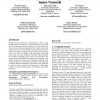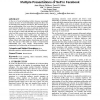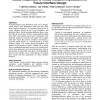HT
2007
ACM
14 years 3 months ago
2007
ACM
Finding relevant information in a hyperspace has been a much studied problem for many years. With the emergence of so called Web 2.0 technologies we have seen the use of social sy...
GROUP
2007
ACM
14 years 3 months ago
2007
ACM
As the use of social networking websites becomes increasingly common, the types of social relationships managed on these sites are becoming more numerous and diverse. This researc...
SIGIR
2010
ACM
14 years 3 months ago
2010
ACM
Web-based social systems enable new community-based opportunities for participants to engage, share, and interact. This community value and related services like search and advert...
CANDT
2009
14 years 3 months ago
2009
We argue that along with social network analysis researchers can also benefit from looking at the identity bonding perspective. In this paper, by synthetic and critical reviewing ...
CANDC
2009
ACM
14 years 3 months ago
2009
ACM
Computing technologies such as games, social networking sites, and virtual environments often reproduce forms of social stigma encountered in everyday real life, as well as introd...
CHI
2007
ACM
14 years 3 months ago
2007
ACM
Do human-human social interactions carry over to humanvirtual human social interactions? How does this affect future interface designers? We replicated classical tests of social i...
WER
1999
Springer
14 years 3 months ago
1999
Springer
In this article we defend the idea that social aspects have strong influence in the software requirements elicitation (Goguen 1993), which drive us to find help in the social scien...
ATAL
2000
Springer
14 years 3 months ago
2000
Springer
Abstract. This paper is concerned with the problem of how effective social interaction arises from individual social action and mind. The need to study the individual social mind s...
CSCW
2000
ACM
14 years 3 months ago
2000
ACM
Social resources like trust and shared identity make it easier for people to work and play together. Such social resources are sometimes referred to as social capital. Thirty year...
AGENTS
2001
Springer
14 years 4 months ago
2001
Springer
This paper promotes social role awareness as a desirable capability of animated agents, that are by now strong affective reasoners, but otherwise often lack the social competence ...



